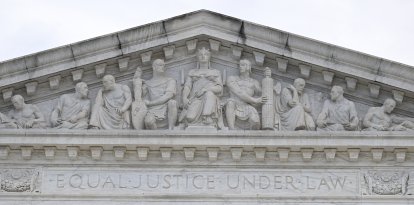What led Gaetz to withdraw his candidacy for attorney general?
Beyond new details about the sex scandal, there is one event that may have triggered the former congressman's swift resignation: the refusal of some Republican senators to endorse him.

Former congressman Matt Gaetz in a file photo
On Thursdday, Republican Matt Gaetz announced his resignation as attorney general nominee to, in his words, not to get in the way or harm the mission of President-elect Donald Trump, who needs to confirm his cabinet as soon as possible to push his government agenda.
Pointedly, Gaetz stated that "While the momentum was strong, it is clear that my confirmation was unfairly becoming a distraction to the critical work of the Trump/Vance Transition," and, as such, he decided to step aside.
"There is no time to waste on a needlessly protracted Washington scuffle, thus I'll be withdrawing my name from consideration to serve as Attorney General. Trump's DOJ must be in place and ready on Day 1," the Republican stated.
I had excellent meetings with Senators yesterday. I appreciate their thoughtful feedback - and the incredible support of so many. While the momentum was strong, it is clear that my confirmation was unfairly becoming a distraction to the critical work of the Trump/Vance…
— Matt Gaetz (@mattgaetz) November 21, 2024
Trump quickly accepted Gaetz's resignation.
However, according to two different news reports there are two main reasons for the sudden change of heart of the former congressman, who until days ago was determined to make his case before the Senate.
According to CNN, Gaetz's resignation came just 45 minutes after the network contacted the congressman for his comments on new details related to his alleged and unconfirmed sexual encounter with a 17-year-old minor.
According to the television network, the woman, who was 17 at the time, testified before the House Ethics Committee that she had a second sexual encounter with Gaetz involving another adult female. This is the first time this new detail was reported publicly.
According to sources with knowledge of the testimony, the woman also mentioned the sexual encounters in a civil deposition as part of a related lawsuit.
"After being asked for comment for this story, Gaetz announced he was backing out as President-elect Donald Trump’s attorney general nominee," CNN reported.
EXCLUSIVE: Gaetz withdrew from AG nomination 45 mins after we called to say we were going to report that “Ethics committee told there was a *second* sexual encounter between Gaetz and 17 year old in 2017.” w/@sarahnferris.” Full story: https://t.co/z244tATQIU
— Paula Reid (@PaulaReidCNN) November 21, 2024
Despite the allegations, Gaetz has repeatedly denied having sex with a minor and, in fact, was not indicted after the Justice Department investigated these alleged sexual encounters that have brought him into the eye of the storm over the past year. The DOJ's own prosecutors who investigated Gaetz recommended that no criminal charges be filed against the Republican.

Politics
House Ethics Committee resisted pressure and won't release report on Matt Gaetz
Joaquín Núñez
According to the CNN report, the second woman allegedly involved in the event denied that she had participated in the second sex act, something that could support Gaetz's denials.
However, despite being judicially off the hook, the Republican had the political threat of the House Ethics Committee, which reopened its investigation into the former Florida congressman once the DOJ concluded its case.
Now the committee faces mounting pressure to release its final report. However, Republicans, along party lines, blocked the effort and agreed to reconvene on Dec. 5 to assess whether or not to release the final report.
But beyond the new details about the allegation against Gaetz, there is one event that may have triggered the former congressman's quick resignation: the refusal of some Republican senators to endorse him.
While Trump and Gaetz held meetings and had calls with many senators who gave their approval to the appointment, the former congressman, according to the NYT, told his entourage that at least four Republican senators were not willing to support him: Lisa Murkowski of Alaska, Susan Collins of Maine, Mitch McConnell of Kentucky and John Curtis of Utah.
Looks plausible that Gaetz was a single vote short pic.twitter.com/cI4Nxy1dRy
— Curt Mills (@CurtMills) November 21, 2024
This relentless opposition, coupled with new details about the sexual allegations, created an unsettled atmosphere around Gaetz's candidacy, which ultimately led to his resignation.
Now the former representative could relaunch his political career by trying to be sworn in in January as congressman-elect, a possibility that seems more plausible.


























